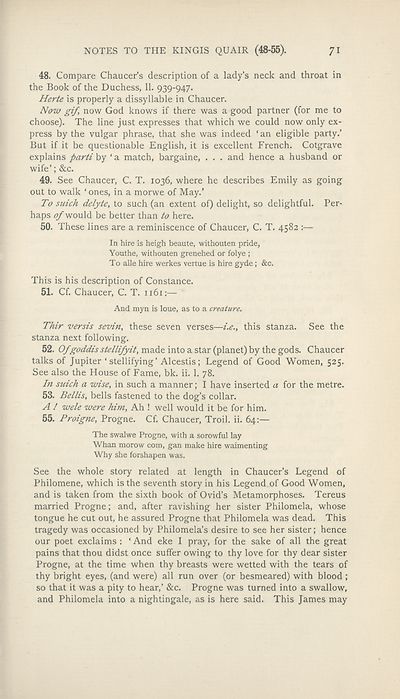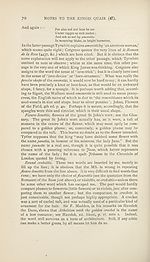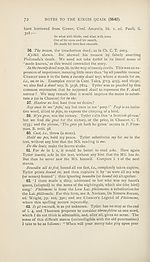Download files
Complete book:
Individual page:
Thumbnail gallery: Grid view | List view

NOTES TO THE KINGIS QUAIR (48-55).
71
48. Compare Chaucer’s description of a lady’s neck and throat in
the Book of the Duchess, 11. 939-947.
Herte is properly a dissyllable in Chaucer.
Now gif, now God knows if there was a good partner (for me to
choose). The line just expresses that which we could now only ex¬
press by the vulgar phrase, that she was indeed ‘ an eligible party.’
But if it be questionable English, it is excellent French. Cotgrave
explains ytar/z'by ‘ a match, bargaine, . . . and hence a husband or
wife’; &c.
49. See Chaucer, C. T. 1036, where he describes Emily as going
out to walk ‘ ones, in a morwe of May.’
To snich delyte, to such (an extent of) delight, so delightful. Per¬
haps tf/-would be better than to here.
50. These lines are a reminiscence of Chaucer, C. T. 4582 :—
In hire Is heigh beaute, withouten pride,
Youthe, withouten grenehed or folye ;
To alle hire werkes vertue is hire gyde ; &c.
This is his description of Constance.
51. Cf. Chaucer, C. T. 1161:—
And myn is loue, as to a creature.
Thir versis sevin, these seven verses—i.e., this stanza. See the
stanza next following.
52. Ofgoddis stellifyit, made into a star (planet) by the gods. Chaucer
talks of Jupiter ‘ stellifying’ Alcestis; Legend of Good Women, 525.
See also the House of Fame, bk. ii. 1. 78.
In suich a wise, in such a manner; I have inserted a for the metre.
53. Beilis, bells fastened to the dog’s collar.
A ! wele were him, Ah ! well would it be for him.
55. Proigne, Progne. Cf. Chaucer, Troil. ii. 64:—
The swalwe Progne, with a sorowful lay
Whan morow com, gan make hire waimenting
Why she forshapen was.
See the whole story related at length in Chaucer’s Legend of
Philomene, which is the seventh story in his Legend of Good Women,
and is taken from the sixth book of Ovid’s Metamorphoses. Tereus
married Progne; and, after ravishing her sister Philomela, whose
tongue he cut out, he assured Progne that Philomela was dead. This
tragedy was occasioned by Philomela’s desire to see her sister; hence
our poet exclaims : ‘ And eke I pray, for the sake of all the great
pains that thou didst once suffer owing to thy love for thy dear sister
Progne, at the time when thy breasts were wetted with the tears of
thy bright eyes, (and were) all run over (or besmeared) with blood ;
so that it was a pity to hear,’ &c. Progne was turned into a swallow,
and Philomela into a nightingale, as is here said. This James may
71
48. Compare Chaucer’s description of a lady’s neck and throat in
the Book of the Duchess, 11. 939-947.
Herte is properly a dissyllable in Chaucer.
Now gif, now God knows if there was a good partner (for me to
choose). The line just expresses that which we could now only ex¬
press by the vulgar phrase, that she was indeed ‘ an eligible party.’
But if it be questionable English, it is excellent French. Cotgrave
explains ytar/z'by ‘ a match, bargaine, . . . and hence a husband or
wife’; &c.
49. See Chaucer, C. T. 1036, where he describes Emily as going
out to walk ‘ ones, in a morwe of May.’
To snich delyte, to such (an extent of) delight, so delightful. Per¬
haps tf/-would be better than to here.
50. These lines are a reminiscence of Chaucer, C. T. 4582 :—
In hire Is heigh beaute, withouten pride,
Youthe, withouten grenehed or folye ;
To alle hire werkes vertue is hire gyde ; &c.
This is his description of Constance.
51. Cf. Chaucer, C. T. 1161:—
And myn is loue, as to a creature.
Thir versis sevin, these seven verses—i.e., this stanza. See the
stanza next following.
52. Ofgoddis stellifyit, made into a star (planet) by the gods. Chaucer
talks of Jupiter ‘ stellifying’ Alcestis; Legend of Good Women, 525.
See also the House of Fame, bk. ii. 1. 78.
In suich a wise, in such a manner; I have inserted a for the metre.
53. Beilis, bells fastened to the dog’s collar.
A ! wele were him, Ah ! well would it be for him.
55. Proigne, Progne. Cf. Chaucer, Troil. ii. 64:—
The swalwe Progne, with a sorowful lay
Whan morow com, gan make hire waimenting
Why she forshapen was.
See the whole story related at length in Chaucer’s Legend of
Philomene, which is the seventh story in his Legend of Good Women,
and is taken from the sixth book of Ovid’s Metamorphoses. Tereus
married Progne; and, after ravishing her sister Philomela, whose
tongue he cut out, he assured Progne that Philomela was dead. This
tragedy was occasioned by Philomela’s desire to see her sister; hence
our poet exclaims : ‘ And eke I pray, for the sake of all the great
pains that thou didst once suffer owing to thy love for thy dear sister
Progne, at the time when thy breasts were wetted with the tears of
thy bright eyes, (and were) all run over (or besmeared) with blood ;
so that it was a pity to hear,’ &c. Progne was turned into a swallow,
and Philomela into a nightingale, as is here said. This James may
Set display mode to: Large image | Zoom image | Transcription
Images and transcriptions on this page, including medium image downloads, may be used under the Creative Commons Attribution 4.0 International Licence unless otherwise stated. ![]()
| Publications by Scottish clubs > Scottish Text Society publications > Old series > Kingis quair > (131) |
|---|
| Permanent URL | https://digital.nls.uk/106994047 |
|---|
| Description | A collection of over 100 Scottish texts dating from around 1400 to 1700. Most titles are in Scots, and include editions of poetry, drama, and prose by major Scottish writers such as John Barbour, William Dunbar, Gavin Douglas, and George Buchanan. Edited by a key scholarly publisher of Scotland's literary history, and published from the late 19th century onwards by the Scottish Text Society. Available here are STS series 1-3. |
|---|

